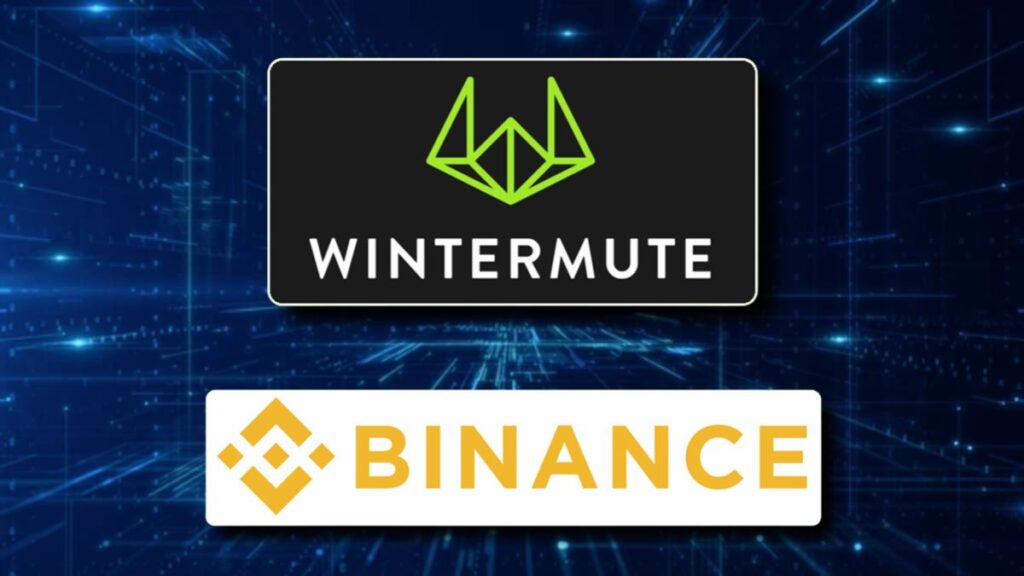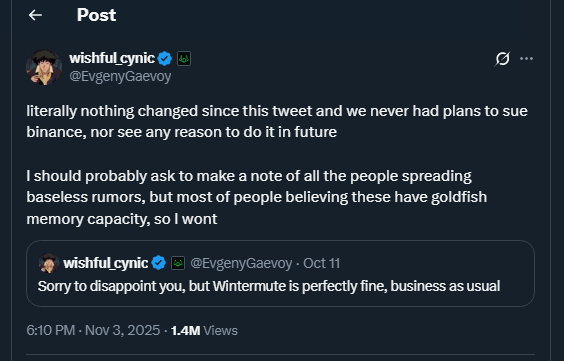TL;DR
- Wintermute firmly denied any intention to pursue legal action against Binance after the October crash, stating the firm never considered suing the exchange.
- Social media rumors suggesting coordinated action by market makers over Auto Deleveraging losses were unfounded and lacked evidence.
- The clarification was seen as a positive signal for the crypto sector, reinforcing confidence that major players prefer collaboration, stability, and long-term growth over legal confrontation.
Wintermute founder Evgeny Gaevoy has once again dismissed the circulating rumors claiming the firm planned to sue Binance following the sharp October flash crash. Gaevoy reaffirmed that Wintermute never intended to take legal action and highlighted that nothing has changed since he originally rejected the idea.
His statement came after widespread speculation on social platforms, where users alleged Wintermute was preparing a lawsuit to recover losses related to Auto Deleveraging (ADL) during the extreme volatility on October 10 and 11. Gaevoy labeled the rumors as pure fiction and rejected claims of coordination with other major trading firms. Former Binance CEO Changpeng Zhao (CZ) backed the clarification by sharing Gaevoy’s post and encouraged users to unfollow accounts spreading false information.
October Crash And Market Reactions
The October downturn was driven by macro-driven uncertainty, sending crypto assets sharply lower within hours. Bitcoin briefly slipped toward 105,000 dollars, while Ethereum and top altcoins suffered solid double-digit declines. Binance experienced a heavy spike in trading volume that strained its infrastructure, which contributed to ADL executions occurring at prices far from fair market value.
Although Binance deployed hundreds of millions of dollars through insurance and refund mechanisms to assist traders affected by oracle disruptions, ADL-related losses were not covered. This revived discussion around the structure of ADL, yet several analysts maintain that the mechanism remains necessary for market stability during extreme volatility.
On-chain data confirmed Wintermute’s portfolio value decreased during the episode; however, there was no evidence of forced liquidations or emergency defensive actions. Wallet activity remained aligned with routine market-making behavior, signaling healthy operations.

Industry Focus Shifts To Market Infrastructure
The event fueled broader debate on strengthening exchange risk systems, liquidity protections, and how derivatives venues should handle high-stress conditions. Market experts noted that headline liquidation figures often exaggerate real capital losses, as a large portion reflects leverage unwinding, not actual capital destruction.
Despite the turbulence, the market demonstrated a swift and resilient recovery. Bitcoin bounced back rapidly, supported by continued spot ETF inflows and renewed institutional participation. Pro-crypto analysts consider this a sign of the asset class’s growing maturity and shock-absorbing ability compared with earlier cycles.











